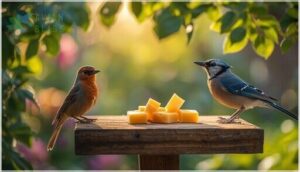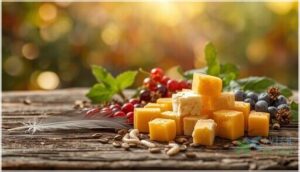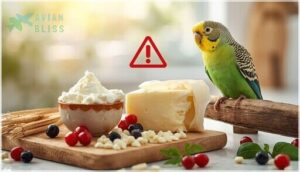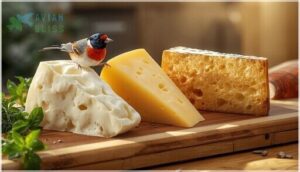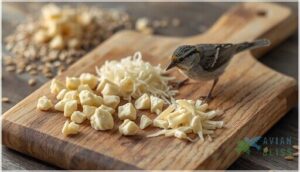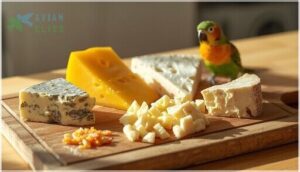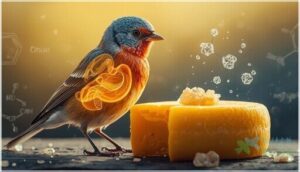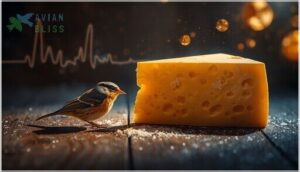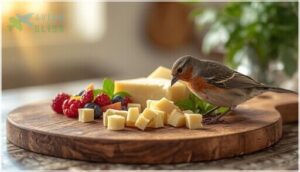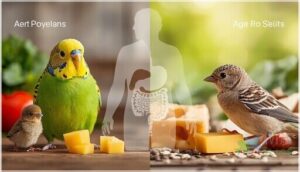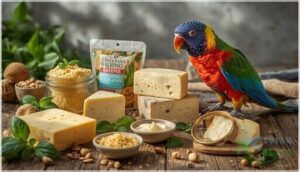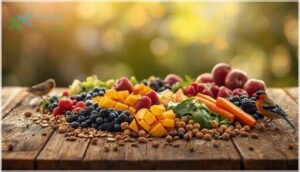This site is supported by our readers. We may earn a commission, at no cost to you, if you purchase through links.
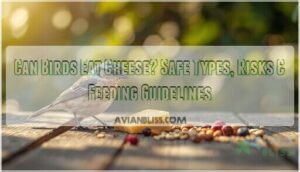
Your backyard bird just snatched a piece of cheddar off your patio table, and now you’re wondering if you’ve accidentally poisoned your feathered visitor. The short answer: birds can eat cheese, but it’s far from ideal. Unlike mammals, most birds lack the enzyme lactase needed to properly digest dairy products.
This means that a seemingly harmless treat could lead to digestive upset, nutritional imbalances, or worse. The type of cheese matters greatly—hard, aged varieties with minimal lactose pose fewer risks than soft, creamy options. Understanding which cheeses are safer and how much to offer can help you make informed decisions about your bird’s diet without turning snack time into a health crisis.
Table Of Contents
- Key Takeaways
- Can Birds Eat Cheese Safely?
- What Nutritional Value Does Cheese Offer Birds?
- Which Types of Cheese Are Safe for Birds?
- What Cheeses Should Birds Avoid?
- How Does Lactose Intolerance Affect Birds?
- What Are The Health Risks of Feeding Cheese?
- How Should Cheese Be Prepared for Birds?
- Can All Birds Eat Cheese Equally?
- Are Non-Dairy and Alternative Cheeses Safe?
- What Are Better Treat Alternatives to Cheese?
- Frequently Asked Questions (FAQs)
- Conclusion
Key Takeaways
- Birds can eat cheese in very small amounts as a rare treat, but most species lack the lactase enzyme needed to properly digest dairy, which can lead to digestive upset and health complications.
- Hard, aged cheeses like Parmesan, Swiss, and cheddar contain less lactose and pose fewer risks than soft cheeses, but all cheese should be limited to pea-sized portions no more than once weekly.
- The high fat and salt content in cheese can cause serious problems including obesity, kidney stress, and calcium imbalances—especially when fed regularly or in larger amounts.
- Fresh fruits, vegetables, seeds, and commercial bird treats provide better nutrition without the digestive risks, making them safer alternatives to cheese for treating your bird.
Can Birds Eat Cheese Safely?
You can feed cheese to birds, but it comes with conditions. Not every bird tolerates cheese the same way, and not all types of cheese are suitable for avian digestion.
Understanding these differences helps you make safer choices when offering cheese as an occasional treat.
Cheese as an Occasional Treat
You can offer cheese as an occasional treat to your bird, not a daily staple. Think of it like dessert—enjoyable in tiny bites, but too much throws off dietary balance.
Feeding safety demands cheese moderation: limit portions to pea-sized pieces once a week or less. Always monitor your bird’s reaction, and discontinue if digestive upset occurs. Proper treat guidelines protect bird nutrition long-term.
When evaluating the nutritional value of cheese, consider the importance of methodological rigor in scientific studies.
Differences Among Bird Species
Species variations mean cheese tolerance differs widely among birds. Parrots and passerines (songbirds) handle small amounts better than waterfowl, whose digestive tracts evolved for aquatic plants. Bird physiology and dietary adaptations shape these responses:
- Parrots metabolize fat-rich foods more efficiently than finches
- Raptors tolerate higher protein loads due to carnivorous ancestry
- Waterfowl struggle with dairy because their systems favor plant material
- Pet species like cockatiels show individual cheese tolerance based on health status
Your bird’s natural diet determines cheese safety.
General Dietary Compatibility
Understanding your bird’s dietary needs means recognizing cheese as an extra, not a necessity. Birds thrive on balanced diets built from seeds, pellets, fruits, and vegetables—foods that naturally meet their nutrient requirements. Cheese won’t harm in tiny amounts, but it can’t replace core nutrition. Think of it like dessert: enjoyable occasionally, but never the main course for ideal bird health.
| Core Diet Components | Role in Avian Nutrition |
|---|---|
| Seeds & Pellets | Primary energy and nutrients |
| Fruits & Vegetables | Vitamins and food variety |
| Occasional Treats | Enrichment only |
What Nutritional Value Does Cheese Offer Birds?
Cheese does contain nutrients that can benefit birds when offered correctly. You’ll find protein and calcium in most cheese varieties, plus extra energy during winter months. However, these benefits come with real limitations compared to what your bird should actually be eating.
Protein and Calcium Content
Cheese delivers complete protein with essential amino acids your bird needs, but don’t overestimate its dietary value. Hard cheeses pack more calcium per serving than soft varieties, yet formulated pellets and seeds remain higher-quality protein sources for your bird diet.
Fat and sodium levels in cheese limit its nutrient value, so you shouldn’t rely on cheese nutrition to meet your bird’s core calcium needs or dietary balance.
Energy Benefits in Cold Weather
When temperatures drop, your bird burns more calories just staying warm—a process called bird thermoregulation that can raise energy needs by 10–20%. Cheese as a treat for birds offers energy dense foods that support winter feeding and seasonal diet adjustments, but you’ll achieve better avian health and wellness by feeding birds safely with balanced portions alongside seeds rather than relying on cheese alone for bird nutrition and diet or its nutritional benefits and risks.
Limitations Compared to Other Foods
Despite its energy density, cheese creates nutrient deficits that disrupt bird nutrition and diet when you rely on it too heavily. Balanced diets built on seeds, pellets, and fresh produce deliver micronutrients dairy products simply can’t match—and cheese consumption competes with those essential foods in your bird’s dietary habits.
- High fat and salt trigger obesity and dehydration
- Lactose intolerance causes digestive upset in many species
- Calcium alternatives like leafy greens offer safer mineral sources
- Dietary imbalance develops when cheese replaces core nutrition
Which Types of Cheese Are Safe for Birds?
Not all cheeses are created equal regarding your bird’s safety. Some varieties are easier to digest and pose fewer health risks than others.
Let’s look at the safest cheese options you can offer as an occasional treat.
Soft Cheeses (Cream Cheese, Ricotta)
You might think cream cheese and ricotta are gentle options, but they still contain lactose that can trigger digestion issues in many birds. These soft cheese types lack the lactase enzyme birds need for proper cheese consumption.
If you offer tiny portions, watch for cheese allergies or upset. Following feeding guidelines means prioritizing bird nutrition with safer dairy alternatives instead.
Low-Lactose Cheeses (Mozzarella, Swiss, Parmesan)
You’ll find that longer cheese aging reduces lactose levels, making mozzarella, Swiss, and Parmesan better cheese types for birds with lactose intolerance. Parmesan has the lowest lactose, while mozzarella contains slightly more.
These low-fat cheese options provide calcium benefits and support digestive health when you offer tiny amounts. Still, nutrient balance matters—even reduced-lactose cheese consumption can cause upset in sensitive birds.
Portion Size and Preparation
You’ll want to cut cheese into pea-sized crumbles or finely shred it to prevent choking hazards. Limit feeding frequency to once weekly for safe serving and proper portion control in bird nutrition. Always serve fully thawed cheese separately from seeds.
These feeding guidelines support moderation in bird feeding—plain cheese without added salt or preservatives is your best choice for feeding birds cheese as an occasional food.
What Cheeses Should Birds Avoid?
Not all cheese is safe for your bird. Some varieties contain harmful molds, additives, or excessive fat and lactose that can cause serious digestive problems.
Let’s look at the specific types you should keep away from your feathered friend.
Blue Cheese and Mold Risks
Blue cheese tops the list of cheese types to completely avoid for your feathered friends. These varieties harbor Penicillium molds that produce mycotoxins—invisible threats that can seriously compromise bird health even when the cheese looks fine.
Understanding the hidden dangers of blue cheese for birds:
- Mold Toxin Risks: Mycotoxin Effects can cause liver damage and gastrointestinal distress in birds, especially those with weakened immunity.
- Avian Respiratory: Inhaling mold spores during eating or preening can irritate sensitive airways and compromise breathing.
- Cheese Contamination: Fungal Exposure isn’t limited to visible veining—toxins spread throughout the product.
- Lactose Intolerance: Blue cheese compounds additional digestive stress onto already limited lactase production.
- Species Vulnerability: Small and juvenile birds face heightened health risks from even minimal mold exposure.
You can’t see or smell many dangerous compounds in blue cheese. The deliberate mold inoculation creates characteristic blue veining, but volatile compounds and potential allergens remain active. Birds lack the palate cues humans have—they’ll consume moldy dairy without recognizing the danger.
Proper storage might reduce surface contamination, but it won’t eliminate the core risk. Mold fragments migrate into cheese interiors, especially with temperature fluctuations. Even trace amounts can trigger respiratory irritation or hepatic strain in sensitive species.
Food safety guidelines consistently discourage feeding mold-containing dairy to animals. Veterinary sources emphasize that bird nutrition and diet should exclude mold-prone items entirely. The unpredictable nature of Mycotoxin Effects makes blue cheese an unnecessary gamble with your bird’s wellbeing.
Blue cheese poses unpredictable mycotoxin risks that veterinary experts agree make it an unnecessary gamble with your bird’s health
Instead of risking Fungal Exposure through blue cheese, focus on safer alternatives. Fresh fruits, leafy greens, and commercial bird treats provide nutrition without compromising avian respiratory health or introducing Cheese Contamination concerns.
Processed and Flavored Cheeses
Processed cheese products bring hidden dangers beyond what you see on the label. These items pack emulsifiers, stabilizers, and extra salt that natural cheese doesn’t contain. Flavored varieties add garlic, herbs, or spices that complicate bird nutrition and diet safety. Higher fat levels in many processed cheese types demand stricter portion control, while unclear lactose content creates digestive risks for birds with lactose intolerance.
Understanding flavored cheese risks and cheese additives helps protect your bird:
| Concern | Risk Factor | Impact on Birds |
|---|---|---|
| Emulsifiers & Stabilizers | Chemical additives absent in natural cheese | Digestive upset, unknown long-term effects |
| Flavoring Agents | Garlic, herbs, seasonings | Potential toxicity, palatability issues |
| Elevated Fat Content | Higher than comparable natural cheese | Weight gain, organ stress |
You can’t always trust ingredient lists to reveal everything. Some formulations hide dairy-derived compounds that challenge lactose-sensitive birds. Brand variations make risk assessment nearly impossible without detailed nutritional data.
Cheese alternatives offer safer paths for treating your bird. Fresh produce, species-appropriate seeds, and commercial bird treats deliver nutrition without processed cheese complications. When you’re choosing cheese as bird food, stick with simple, natural cheese types instead of processed versions. Your bird’s digestive system wasn’t designed to handle modern food engineering—keep it simple, keep it safe.
High-Lactose and High-Fat Cheeses
Beyond processed varieties, certain natural cheeses carry their own risks. High-lactose dairy products challenge birds lacking lactase enzymes, triggering digestive issues that compromise bird nutrition and diet.
Fat content becomes another concern—regular servings promote bird obesity and fatty liver disease. Cheese moderation matters here: even “safe” varieties demand strict portion control.
Understanding cheese and lactose intolerance in birds guides smarter choices when you’re considering cheese as bird food.
How Does Lactose Intolerance Affect Birds?
Birds don’t produce enough lactase, the enzyme needed to break down lactose in dairy products. This means many birds can’t digest cheese properly, leading to uncomfortable digestive problems.
Understanding how lactose affects your bird’s system helps you choose safer options and avoid unnecessary health issues.
Avian Digestive System and Lactase
Your bird’s digestive tract wasn’t built for dairy. Most birds lack sufficient lactase enzyme to break down lactose—the sugar in cheese—because their natural diet never included it. This matters for bird nutrition and diet planning.
Here’s what happens inside your bird’s gut:
- The proventriculus and gizzard grind food but can’t produce enough lactase
- Undigested lactose pulls water into the intestines, disrupting avian gut health
- Altered gut microbiome from dairy can increase gas and discomfort
- Enzyme interactions fail when lactose overwhelms your bird’s digestive capacity
Symptoms of Lactose Intolerance
When lactose sensitivity hits your bird, you’ll notice changes fast. Diarrhea or watery droppings signal digestive issues—your bird’s gut can’t handle the cheese consumption. Watch for reduced appetite, lethargy, or abdominal bloating after dairy. Some birds show behavioral shifts like irritability.
Persistent lactose intolerance leads to malabsorption risks, weight loss, and compromised gut health. If you spot avian diarrhea after feeding cheese, stop immediately.
Safer Cheese Choices for Sensitive Birds
Hard cheeses shield sensitive birds from lactose sensitivity better than soft varieties. Swiss, cheddar, and Parmesan contain less than 1 gram of lactose per serving, reducing digestive risks tied to cheese consumption.
Guidelines for low-fat cheese in avian nutrition:
- Offer aged cheeses only—they support bird nutrition without overwhelming lactase-deficient systems
- Limit portions to prevent cheese allergies and kidney strain across bird species
- Space treats weeks apart to minimize cumulative effects
- Consider dairy alternatives or calcium supplements instead
- Consult your vet before feeding birds with existing lactose intolerance
Bird owners should research bird dairy safety to guarantee a balanced diet for their pets.
What Are The Health Risks of Feeding Cheese?
Cheese can create serious health problems for birds when you feed it too often or in large amounts. The high fat and salt content puts strain on their small bodies in ways that aren’t always obvious at first.
Understanding these risks helps you make better decisions about what treats are truly safe for your feathered friends.
Obesity and Weight Gain
Cheese can turn a well-meaning treat into a weight problem faster than you’d expect. Its caloric density—often 70 to 100 calories per ounce—adds up quickly in your bird’s daily intake. Regular portions displace fiber-rich foods that keep your bird satisfied and lean.
To support bird weight management and avian obesity prevention, limit cheese to rare, tiny treats. Prioritize healthy feeding practices with balanced diet planning, fresh vegetables, and structured portion control for ideal avian nutrition and bird health.
Kidney Problems and Calcium Imbalance
Overload from cheese-based treats can quietly compromise renal health. When you offer too much calcium-rich cheese, your bird’s kidneys work overtime to manage mineral balance, risking long-term damage to kidney function and calcium regulation.
- Excess calcium stresses avian nephrology pathways and impairs filtration.
- Dehydration concentrates minerals, elevating serum calcium dangerously.
- Chronic imbalance disrupts eggshell quality in laying birds.
- Regular veterinary checks safeguard renal health during calcium content adjustments.
Digestive Upset and Allergic Reactions
Your bird’s digestive system can rebel against dairy proteins and lactose intolerance, triggering bloating, loose droppings, or respiratory distress. Lactose sensitivity disrupts gut health, while casein may provoke allergic responses over time. Moldy cheese introduces toxic reactions that worsen digestive issues.
Monitor your bird’s dietary habits closely—if you spot swelling, regurgitation, or greasy stools, stop feeding cheese immediately to protect avian health and wellness from these health risks.
How Should Cheese Be Prepared for Birds?
If you choose to offer cheese to your birds, proper preparation makes a real difference in safety and digestion. The way you cut, serve, and combine cheese with other foods affects how well your birds can handle it.
Let’s look at the best methods to prepare cheese as an occasional treat.
Cutting and Shredding Cheese
You’ll need to prepare cheese the right way to reduce choking hazards and digestive upset. Cut it into pea-sized pieces for small birds and no larger than half an inch for bigger species. Shredding works well too—offer tiny shreds that your bird can easily manage.
Lowfat cheese options help minimize fat intake, especially important for birds with lactose intolerance or sensitivity to dairy products.
Mixing Cheese With Birdseed or Fresh Foods
Mixing small amounts of cheese with birdseed or fresh foods can make it easier for birds to accept this occasional treat. Keep cheese to no more than 10% of the total offering and pair shredded pieces with seeds or bite-sized fruits like apple.
This approach maintains dietary balance considerations and follows cheese safety guidelines for wildlife feeding.
Serving Frequency and Portion Control
Once you’ve decided how to prepare cheese, establish clear treat limits to protect bird health and nutrition. Your feeding schedules should reflect dietary balance principles:
- Offer cheese no more than once or twice weekly, limiting portion sizes to thumbnail-sized pieces
- Adjust amounts downward for younger, elderly, or ill birds to maintain proper nutrition planning
- Monitor body condition closely, reducing cheese consumption in birds if weight gain appears
Can All Birds Eat Cheese Equally?
Not all birds can handle cheese the same way. Pet birds, wild birds, and different species each have unique digestive systems and dietary needs that affect how they process dairy.
Your bird’s age and overall health also play a role in whether cheese is a safe treat option.
Pet Birds Vs. Wild Birds
Your pet bird’s life differs dramatically from its wild cousins, and that shapes how you should approach cheese feeding. Pet birds rely on your controlled diet, while wild birds forage freely across diverse ecosystems. This contrast in avian habitat and foraging behavior means pet bird nutrition needs more careful monitoring than wild bird diets, especially with lactose-rich treats.
| Aspect | Pet Birds | Wild Birds |
|---|---|---|
| Diet Control | Owner-provided, limited variety | Self-foraged, diverse natural foods |
| Cheese Exposure | Controlled portions possible | Unpredictable from feeders/scraps |
| Health Monitoring | Regular observation feasible | Minimal tracking available |
| Dietary Adaptation | Accustomed to prepared foods | Species-specific foraging strategies |
| Lactose Risk | Easier to manage portions | Harder to control intake |
Understanding these differences helps you make informed decisions about bird dietary habits and whether cheese fits your bird’s lifestyle.
Species-Specific Tolerances
Different bird species show strikingly different tolerances to cheese, so you can’t treat all birds the same. Your bird’s digestive sensitivities depend on its natural dietary habits and physiology. Consider these species-specific responses:
- Parrots and cockatiels may handle tiny cheese portions, but individual tolerance varies widely
- Small passerines often avoid dairy due to lactose intolerance in birds and high fat levels
- Waterfowl metabolize fats differently, influencing their cheese tolerance in occasional servings
Wild birds generally lack dairy adaptation, making cheese supplementation risky for routine feeding.
Age and Health Considerations
Beyond species differences, your bird’s age and current health status dramatically shape cheese tolerance. Younger birds have delicate digestive systems and should receive only tiny, rare portions—if any.
Birds struggling with bird obesity or metabolic risks must avoid cheese’s high fat and calorie density.
Kidney health concerns require limiting excess calcium to prevent calcium imbalance, while lactose intolerance in birds varies individually, demanding careful monitoring for digestive issues.
Are Non-Dairy and Alternative Cheeses Safe?
Non-dairy and alternative cheeses might seem like a safer option, but they come with their own set of concerns for birds. These products often contain ingredients and additives that aren’t part of a bird’s natural diet. You need to understand what’s in these alternatives before offering them to your feathered friends.
Plant-Based Cheese Ingredients
Vegan cheese and plant milks like almond, cashew, or coconut don’t solve lactose intolerance in birds—they bring different concerns. These dairy substitutes often contain coconut oil, tapioca starch, and stabilizers like carrageenan that your bird’s digestive system isn’t designed to process.
Nutritional yeast adds B vitamins, but nondairy cheese alternatives still lack appropriate avian nutrition. Skip these cheese alternatives entirely.
Additives and Preservatives
When scanning cheese labeling for bird treats, watch for preservatives like potassium sorbate and mold inhibitors that regulatory standards allow in dairy products but don’t support animal nutrition.
Additive risks multiply with processed options—emulsifiers, stabilizers, and artificial flavors introduce toxic compounds your bird’s system can’t handle.
Preservative effects on food safety matter for humans, not for bird dietary habits. Choose plain cheese or skip it entirely.
Suitability for Bird Diets
Plant-based cheeses don’t solve the core problem—your bird’s dietary needs don’t align with human alternatives. These products often contain oils, starches, and flavor enhancers that complicate avian dietary needs and digestive health.
- Most vegan cheeses use coconut or palm oil, which birds don’t need
- Thickening agents can trigger food allergies or stomach upset
- Salt levels rival traditional dairy, stressing kidneys
- Bird nutrition and diet require species-appropriate pellets and produce
- Feeding guidelines advise skipping all cheese substitutes entirely
Stick to proven bird dietary habits.
What Are Better Treat Alternatives to Cheese?
You don’t have to rely on cheese to treat your birds. Plenty of healthier alternatives provide better nutrition without the risks of high fat, salt, and lactose.
Let’s look at some options that give your feathered friends the variety and nutrients they need.
Fruits and Vegetables
Fresh fruits and leafy greens offer excellent nutrition for your bird’s health. You’ll find vitamins A and C in fruit nutrition that support plumage, while vegetables like carrots and bell peppers provide beta-carotene and fiber for digestion.
Create a bird salad with varied produce to maintain nutritional balance. Wash everything thoroughly, and remember that some fruits contain high sugar—moderation keeps avian health ideal.
Bird-Safe Seeds and Nuts
Seeds and nuts give your bird essential fats and protein without cheese’s risks. Choose unsalted sunflower seeds in moderation—they’re high in fat but loved by most bird species. Proper seed storage keeps offerings fresh for backyard birds and wild birds alike.
Tuck plain nuts into foraging toys to encourage natural bird foraging behaviors, and select mixed birdseed with millet for balanced nut nutrition across birdwatching sessions.
Commercial Bird Treats
Commercial bird treats deliver balanced bird nutrition without cheese’s drawbacks. You’ll find three reliable treat formulations at most pet stores:
- Fortified pellets supply vitamins and minerals customized to species needs
- Seed mixes combine grains with dried fruits for variety during birdwatching sessions
- Calcium supplements support egg-laying birds better than cheese as a treat for birds
Always check serving sizes and follow manufacturer guidance for safe bird feeding and safety.
Frequently Asked Questions (FAQs)
Can birds eat cheddar cheese?
Yes, birds can eat cheddar cheese in very small amounts as an occasional treat.
However, cheddar’s high fat and salt content pose avian diet risks, so strict feeding guidelines and portion control are essential for bird health.
Is cheese safe for dogs to consume?
Cheese can be given to dogs in small amounts as an occasional treat. Many dogs are lactose intolerant and may experience digestive upset, so choose low-fat, plain varieties without toxic additives like garlic.
Can birds eat grated cheese?
Grating methods make cheese easier to consume, yet bird dairy limits demand caution. You can offer grated cheese sparingly, but watch for cheese allergy signs like loose stools.
Cheese storage tips prevent mold, protecting avian health and wellness.
Can birds eat old cheese?
No—old cheese poses serious risks. Mold, bacteria, and higher salt levels threaten bird health. Fermented or spoiled dairy produces toxins affecting digestion. Skip aged varieties; fresh, safe alternatives protect your feathered friends better.
Can birds eat white cheese?
White cheese is a bit of a gray area for your feathered friends.
You can offer tiny portions as a rare treat, but watch for lactose sensitivity and digestive upset in most bird species.
Is cheese good for birds?
You shouldn’t rely on cheese for bird nutrition and diet. While it offers calcium and protein, the high fat and salt content pose avian health risks that outweigh benefits as part of dietary habits.
Is it okay to feed birds cheese?
Feeding birds cheese isn’t the end of the world, but you should offer it only as a rare, tiny treat.
Most bird species lack enzymes for efficient dairy digestion, risking digestive upset and health issues.
What cheese is best for birds?
Low-lactose options like mozzarella, Swiss, and parmesan work best for bird species. Soft cheeses such as cream cheese and ricotta are also safe choices.
Always serve plain varieties in tiny portions with proper cheese preparation techniques.
Can one eat milk and cheese?
Most humans can enjoy dairy—though some of us lack enough lactase to digest lactose comfortably. Aged cheese usually sits easier than milk, while lactose-free options and plant-based alternatives offer calcium without the digestive rebellion.
Can birds eat cheese in bird feeders?
You shouldn’t place cheese in bird feeders. Outdoor storage causes rapid spoilage, attracting pests and mold.
Most wild birds lack lactose tolerance, making cheese unsuitable despite backyard bird feeding enthusiasm among birdwatching communities.
Conclusion
Before the era of smartphones and instant answers, you’d rely on instinct alone when feeding birds. Now you know the truth: can birds eat cheese? Yes, but sparingly.
Choose aged, low-lactose varieties like Parmesan or Swiss. Keep portions small, infrequent, and always monitor your bird’s response. When doubt creeps in, skip the dairy altogether.
Offer fruits, vegetables, or species-appropriate seeds instead. Your bird’s health depends on informed choices, not guesswork.
- https://www.nwf.org/Magazines/National-Wildlife/2010/Bird-seeds
- https://www.avianandanimal.com/bird-nutrition.html
- https://web.stanford.edu/group/stanfordbirds/text/essays/Diet_and_Nutrition.html
- https://www.reallywildbirdfood.co.uk/news/post/2020/04/06/what-kitchen-scraps-can-i-feed-to-my-birds
- https://www.reddit.com/r/Ornithology/comments/12dovvq/do_birds_eat_cheese/

